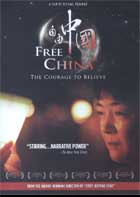
Free China: The Courage to Believe 2013
Distributed by Passion River Films, 154 Mt. Bethel Rd., Warren, NJ 07059; 732-321-0711
Produced by Kean Wong and Michael Perlman
Directed by Michael Perlman
DVD , color and b&w, 61 min.
Sr. High - General Adult
Asia, Economics, Education, Human Rights, International Relations, Religious Studies
Date Entered: 05/04/2015
Reviewed by Jason R. Harshman, University of IowaFree China: The Courage to Believe opens with a short overview of Buddhist principles followed by a quick movement through China’s involvement in WWII, the civil war between the Nationalists and Communists, and the ascension to power of Mao Tse-tung in 1949. Within the first five minutes the viewer is introduced to Jennifer Zeng, a former member of the Communist Party, and Dr. Charles Lee, a Chinese American medical doctor, who provide the central narratives about the horrifying treatment that members and activists involved in Falun Gong suffered under the Communist Party.
The Falun Gong movement of the early 1990s that sought to return to ancient Taoist and Buddhist beliefs served as the foundation for resistance and movements for the protection of human rights across China. As followers of Falun Gong and it’s key principles of truth, compassion, and tolerance, Jennifer and Charles recall how their beliefs pushed them to be more active in their resistance against the Chinese Communist Party and their resulting arrests and long separations from their respective families. Woven within their narratives are interviews with U.S. Ambassadors and Congressmen who were aware of the situation in China, but limited in their actions.
After a brief discussion about how her family members came to join the Communist Party during the 1960s, Jennifer recalls her experience as a demonstrator in Tiananmen Square during the spring of 1989. Charles, fearing that his participation in the protests of 1989 would lead to his being blacklisted and thus unable to leave the country, did not participate and eventually fled to the U.S. to become an American citizen.
The subsequent prohibition and crackdown against Falun Gong, referred to as an “evil cult” by the state controlled newspapers and television stations, spread across 19 provinces in China as the 20th century came to an end. As the 21st century began, the state used internet surveillance to monitor members of Falun Gong and instituted programs of “thought education” to convert followers back to the state party ideology.
Charles’ narrative includes an insightful telling of how Falun Gong practitioners infiltrated media outlets to organize resistance against the state. Despite being able to leave China and live in the U.S. free form the reach of the Communist Party, he returned to be part of the resistance, only to be arrested and sentenced to three years in prison.
The first hand accounts and video of the tortuous treatment prisoners endured in detention centers, labor prisons, and during public demonstrations are gripping. Even more troubling, is the economic focus taken by the filmmakers as Jennifer and Charles discuss the types of products they and other Falun Gong prisoners were forced to make for export to other countries, including the United States.
The emotional, physical, and psychological anguish experienced by Jennifer, Charles, and thousands of other Chinese citizens will cause the viewer to ask why the international human rights community has not done more. The film’s analysis of the intersection of media, surveillance, and human rights violations makes for a compelling and emotionally stirring introduction to the complex and dehumanizing relationships that exists between citizens, global capitalism, and governing bodies. Free China website.
Awards
- 2014, International Winner, Feature Documentary at the 12th Annual Garden State Film Festival; Atlantic City, NJ.
- 2012, Best of the Fest, Denver International Film Festival, Denver, CO